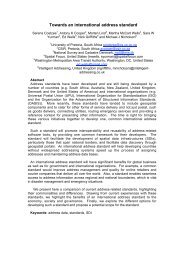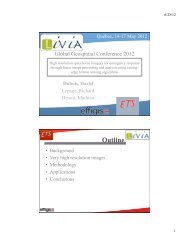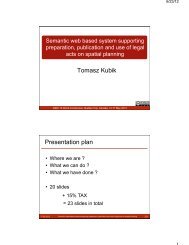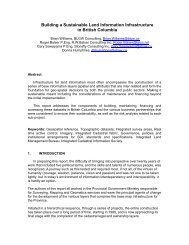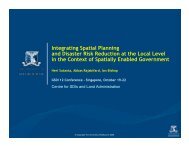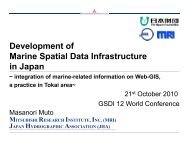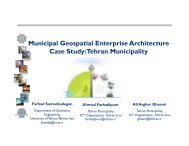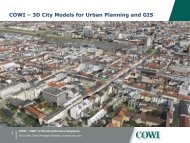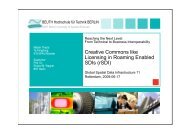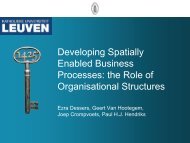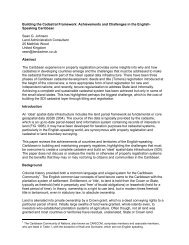- Page 1 and 2: GSDI Global Spatial Data Infrastruc
- Page 4 and 5: SDI Convergence Research, Emerging
- Page 6 and 7: Table of Contents Foreword vii Peer
- Page 8 and 9: Foreword This book is the result of
- Page 10 and 11: Spatial Data Infrastructure Converg
- Page 12 and 13: SDIs are not for free, and thus nee
- Page 14 and 15: gional level specific and complete
- Page 16: management issues. They do not foll
- Page 19 and 20: esses (scenario 5b in Figure 1) req
- Page 21: implements the SDI concept. INSPIRE
- Page 25 and 26: The toolbar at the top of the map a
- Page 27 and 28: 18 Figure 5: Technical implementati
- Page 30 and 31: Development and Deployment of a Ser
- Page 32 and 33: the development of the services off
- Page 34 and 35: Web Applications Services Aplicatio
- Page 36 and 37: Figure 2: ISO 19119 elements for se
- Page 38 and 39: means of their capabilities informa
- Page 40 and 41: - Column Nr_dc (and its associated
- Page 42: Nebert D., Whiteside A. and P. Vret
- Page 45 and 46: of the four essential parts of a su
- Page 47 and 48: 2.1.2 ICT standards web services Fo
- Page 49 and 50: model (see Figure 3). The four comp
- Page 51 and 52: 4. FINANCIAL MODELS 4.1 Cost models
- Page 53 and 54: 5. Hybrid models: These are models
- Page 55 and 56: 4.4 Price strategies Apart from the
- Page 57 and 58: 6. CONCLUSIONS AND RECOMMENDATIONS
- Page 59 and 60: MICUS Management Consulting GmbH (2
- Page 62 and 63: Standard Licences for Geographic In
- Page 64 and 65: 3. PHASE I: EUROPEAN CONTEXT AND AC
- Page 66 and 67: The reuse of public sector informat
- Page 68 and 69: (c) free copies or privileged acces
- Page 70 and 71: The ‘Guidelines on the use of geo
- Page 72 and 73:
Legal Simcity; Legislative Maps and
- Page 74 and 75:
Figure 1: Result set showing protec
- Page 76 and 77:
Figure 3: Detailed text-to-map retr
- Page 78 and 79:
(Simple Knowledge Organization Syst
- Page 80 and 81:
Legal Atlas approach, except for pe
- Page 82 and 83:
Furthermore, we pointed out that th
- Page 84 and 85:
Power and Privacy: the Use of LBS i
- Page 86 and 87:
for these needs by increasing the q
- Page 88 and 89:
TARGET [citizen(s)] 3.2.2 Citizens
- Page 90 and 91:
tionship with the citizen-subject.
- Page 92 and 93:
4.4 European case law 4.4.1 Rotaru
- Page 94 and 95:
Without prejudice to the general da
- Page 96:
Taylor, J.A., A.M.B. Lips and J. Or
- Page 99 and 100:
these datasets. Afflerbach et al. (
- Page 101 and 102:
gration can be realised. This secti
- Page 103 and 104:
94 Table 2: Main classes in NEN3610
- Page 105 and 106:
96 Table 3: Slightly different attr
- Page 107 and 108:
grassy area in TOP10NL data (right)
- Page 109 and 110:
Figure 3: IMGeo roads (a) and TOP10
- Page 111 and 112:
3.2 Recommendations for integrating
- Page 113 and 114:
Figure 7: Modelling sport area as B
- Page 115 and 116:
Stoter, J.E., Morales, J.M., Lemmen
- Page 117 and 118:
SDI. This evaluation, as well as an
- Page 119 and 120:
ConsultCo now executes their geocod
- Page 121 and 122:
4.1 The Catalogue 112 Figure 2: Obj
- Page 123 and 124:
114 Figure 3: The address data cata
- Page 125 and 126:
multiple data services or resources
- Page 127 and 128:
6. CONCLUSION We presented a scenar
- Page 129 and 130:
OGC OGF (2007). Memorandum of Under
- Page 131 and 132:
the identification, the extent, the
- Page 133 and 134:
integration of metadata and spatial
- Page 135 and 136:
126 Category Criteria Technical Sta
- Page 137 and 138:
cords as required. The application
- Page 139 and 140:
element in the metadata record. Thi
- Page 141 and 142:
132 Category Criteria Technical Sta
- Page 143 and 144:
MET designers should focus greatly
- Page 145 and 146:
136
- Page 147 and 148:
lative effects of activities on the
- Page 149 and 150:
fication both of data and models. T
- Page 151 and 152:
study described in the next section
- Page 153 and 154:
tionality. Themes are ‘map view
- Page 155 and 156:
146 Figure 5: Registration screen f
- Page 157 and 158:
As the research progresses more fee
- Page 159 and 160:
Pettit, C., W. Cartwright, I. D. Bi
- Page 161 and 162:
Over the last few years, important
- Page 163 and 164:
- the Regional Topographic Database
- Page 165 and 166:
- the attributes of each of these t
- Page 167 and 168:
5. METADATA MANAGER For metadata cr
- Page 169 and 170:
160
- Page 171 and 172:
In the business management literatu
- Page 173 and 174:
To use this strategy, effective con
- Page 175 and 176:
whether the financial support is fr
- Page 177 and 178:
pation and control of their own qua
- Page 179 and 180:
With respect to this description, t
- Page 181 and 182:
Huarng, F. and Y.T. Chen (2002). Re
- Page 183 and 184:
174
- Page 185 and 186:
(GPS) devices have changed the natu
- Page 187 and 188:
equired to know which properties th
- Page 189 and 190:
The first phase of the EcoGeo Proje
- Page 191 and 192:
Adding a ne w organisation in the p
- Page 193 and 194:
6. CONCLUSIONS AND FUTURE WORK The
- Page 195 and 196:
Goodchild, M. (1995). “Geographic
- Page 197 and 198:
188
- Page 199 and 200:
2. APPLICATION OF SPATIAL INFORMATI
- Page 201 and 202:
a set of simple tools and applicati
- Page 203 and 204:
Russia is just at the beginning in
- Page 205 and 206:
to explore appropriate services for
- Page 207 and 208:
Nevertheless it can be stated that,
- Page 209 and 210:
REFERENCES Abdulharis, R., van Loen
- Page 211 and 212:
Brazil http://www.gisdevelopment.ne
- Page 213 and 214:
204
- Page 215 and 216:
vertical integration of multiple le
- Page 217 and 218:
went from being “nice to have”
- Page 219 and 220:
Approximately 59% of LGAs indicated
- Page 221 and 222:
Variables 212 Table 2: Variables th
- Page 223 and 224:
5. DISCUSSION AND IMPLICATIONS FOR
- Page 225 and 226:
Giff, G. (2006). "The value of perf
- Page 227 and 228:
Warnest, M., A. Rajabifard and I.P.
- Page 229 and 230:
programme. Nevertheless the term 'S
- Page 231 and 232:
This distinction is also reflected
- Page 233 and 234:
several decades or more. In essence
- Page 235 and 236:
to play a larger part in the develo
- Page 237 and 238:
Masser, I. (2005). GIS Worlds: crea
- Page 239 and 240:
Studies of cooperation as a subject
- Page 241 and 242:
232 Figure 1: The ‘SDI-based netw
- Page 243 and 244:
Questions of SDI are strongly integ
- Page 245 and 246:
This leads to the conclusion that w
- Page 247 and 248:
Brunsson, N. (2006). The organizati
- Page 249 and 250:
However, current SDI design focuses
- Page 251 and 252:
242 Figure 1: Marine and coastal ma
- Page 253 and 254:
244 Figure 3: Issues and challenges
- Page 255 and 256:
emerged in response to a global rea
- Page 257 and 258:
The OGC/TC 211 implementation speci
- Page 259 and 260:
Results from European Spatial Data
- Page 261 and 262:
Nebert , D.D. (ed.) (2004). Develop
- Page 263 and 264:
The article begins by outlining the
- Page 265 and 266:
4. INITIAL RESPONSES TO THE RRRs CH
- Page 267 and 268:
cluded a qualitative and quantitati
- Page 269 and 270:
As an example the ‘Spatial and Te
- Page 271 and 272:
Dale, P., and McLaughlin, J.D. (198
- Page 273 and 274:
Van Oosterom, P.J.M., Lemmen, C.H.J
- Page 275 and 276:
each stakeholder can access, use, a
- Page 277 and 278:
elow (Rajabifard et al., 2003a). Ho
- Page 279 and 280:
3.3 Evolution Theory and SDI Evolut
- Page 281 and 282:
spread of a new idea from its sourc
- Page 283 and 284:
institutional complexities. This is
- Page 285 and 286:
with existing institutional arrange
- Page 287 and 288:
Hofstede, G. and G.J. Hofstede (200



